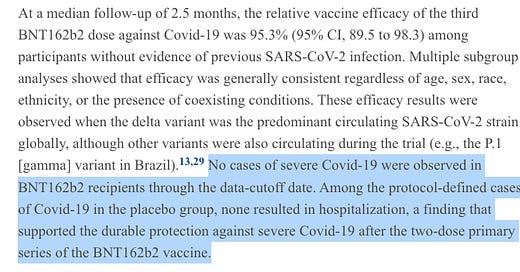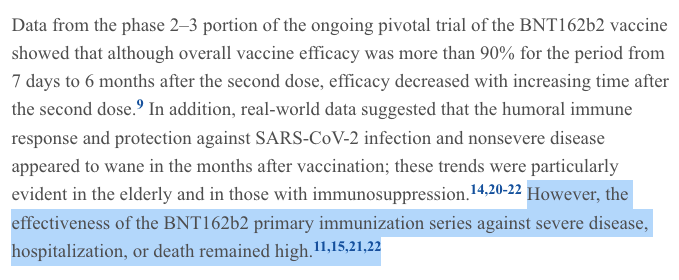FDA approve annual booster for COVID-19, but there is no good evidence supporting boosters for COVID-19, much less annual boosters.
Recently, FDA announced a move to recommend annual COVID-19 boosters.
Unfortunately, there are no good data to support even a single booster, much less annual boosters.
In this randomized controlled trial published in the New England Journal of Medicine, just a single Pfizer booster above the standard 2-dose vaccination produced the following results:
Vaccine group of 5081 participants:
7 symptomatic COVID infections
1264 adverse events
0 hospitalizations
Placebo group of 5044 participants:
124 symptomatic COVID infections
326 adverse events
0 hospitalizations
So what the 3rd dose of the COVID vaccine does is make a tradeoff:
A much higher risk of adverse events, with almost no COVID infections (vaccine)
vs.
A much lower risk of adverse events, with a small risk of mild COVID infection (no vaccine)
The risk of death, hospitalization, and severe disease is the same.
As the authors write in the discussion:
So what do you want? A much higher risk of adverse events from the vaccine (increase from 6.5% to 25%) and a near-zero risk of mild COVID (from 2% to 0.1%)? Or do you want to take your chances with a small risk of COVID (2%) but do away with adverse events?
That is the tradeoff with the third dose of the vaccine.
And this was in participants with a median age of about 50.
Now factor in the unknown risk of myocarditis in younger males, and the risk-benefit ratio becomes even less clear in that subpopulation.
Even less evidence exists for annual boosters. No such RCTs. Just observational studies.
So why is the FDA promoting annual COVID-19 boosters? Why aren’t they demanding more studies demonstrating clear benefit?
Money. If you work for FDA and don’t hassle the pharmaceutical industry too much, you might get a very cushy job after you retire.
The fox is guarding the hen house.
Sad.






I read your Newsweek piece and I wanted to offer constructive criticism. I assume you’re a real person who means what they say. Though in the bigger picture that sort of message (from Newsweek) doesn’t go nearly far enough. Trying to “restore trust” without first achieving justice for wrongs can only ever be apologetics for the status quo. We should NOT return to 2019 levels of trust and confidence in “science” and “democracy.” 2020-2022 revealed how vacuous the expertise of claimed authorities was and STILL IS. The solution isn’t to let the authorities apologize and move on, the solution is to pursue justice for all the wrongs and do root cause analysis followed by hard institutional changes so it can never happen again. Only then, and after many years of good behavior, can authorities ever hope to deserve regaining trust.
Kevin I write this not to attack you. I assume you mean well. I encourage you in the strongest possible terms to adopt the mantle of radical transparency, justice for all wrongs, root cause analysis, and hard institutional changes so this never happens again. Apologies are a great thing on a 1:1 basis and I accept your apology as one human being to another. Though as a public person who is trying to make the world a better place your public apology works against your own goal when it's not coupled with awareness of and action toward FIRST solving the problem(s) that led us to here. Until and unless authorities DESERVE trust, we shouldn't try to repair their image let alone give them trust. Currently they don't DESERVE our trust, as the evidence amply indicates up to and including today. The FDA and CDC (etc) haven't changed their bad behavior let alone become transparent let alone pursued justice for their wrongs let alone done root cause analysis or made hard changes: NONE OF THAT HAS HAPPENED! So it's a terrible idea to try and "restore trust." Trusting people and institutions who don't deserve to be trusted is what a battered spouse does. "But next time will be different, I really love you!" That's what a mere apology means, without justice and a lot more.
I intend for this to be constructive and not an attack on you -- I agree with most of your message in that Newseek article. I hope that comes through. Have a great day!
https://epistemologist.substack.com/p/do-not-trust-any-authority-without
I agree with the sentiment, and while it's technically true that the adverse event % is higher in the booster arm compared to the placebo, when you look at Table 2 from the paper and consider the specific adverse events recorded it's clear almost all of the additional adverse events in the booster arm are transient injection site reactions or the day or two of myalgia/headaches/mild fever common after the vaccine. Presenting the information as a 25% chance of adverse events vs 6.5% without brings to mind clotting complications, myocarditis, and other severe potential consequences of the vaccine for readers less familiar with the topic or those who don't check the paper, which due to sample size did not seem to capture such complications. This may strike some as misleading. The crux of the argument is still valid though: especially for those not at high risk of severe COVID infection, the tradeoff for getting a booster and resigning to a small but guaranteed risk of potentially severe complications is not clearly superior to incurring a small but only potential risk of complications from the virus itself. Pressure on the FDA to provide a single, definitive pro-COVID vaccine message still seems to still be winning out over the logical stratified approach of recommending boosters only for those at high risk.